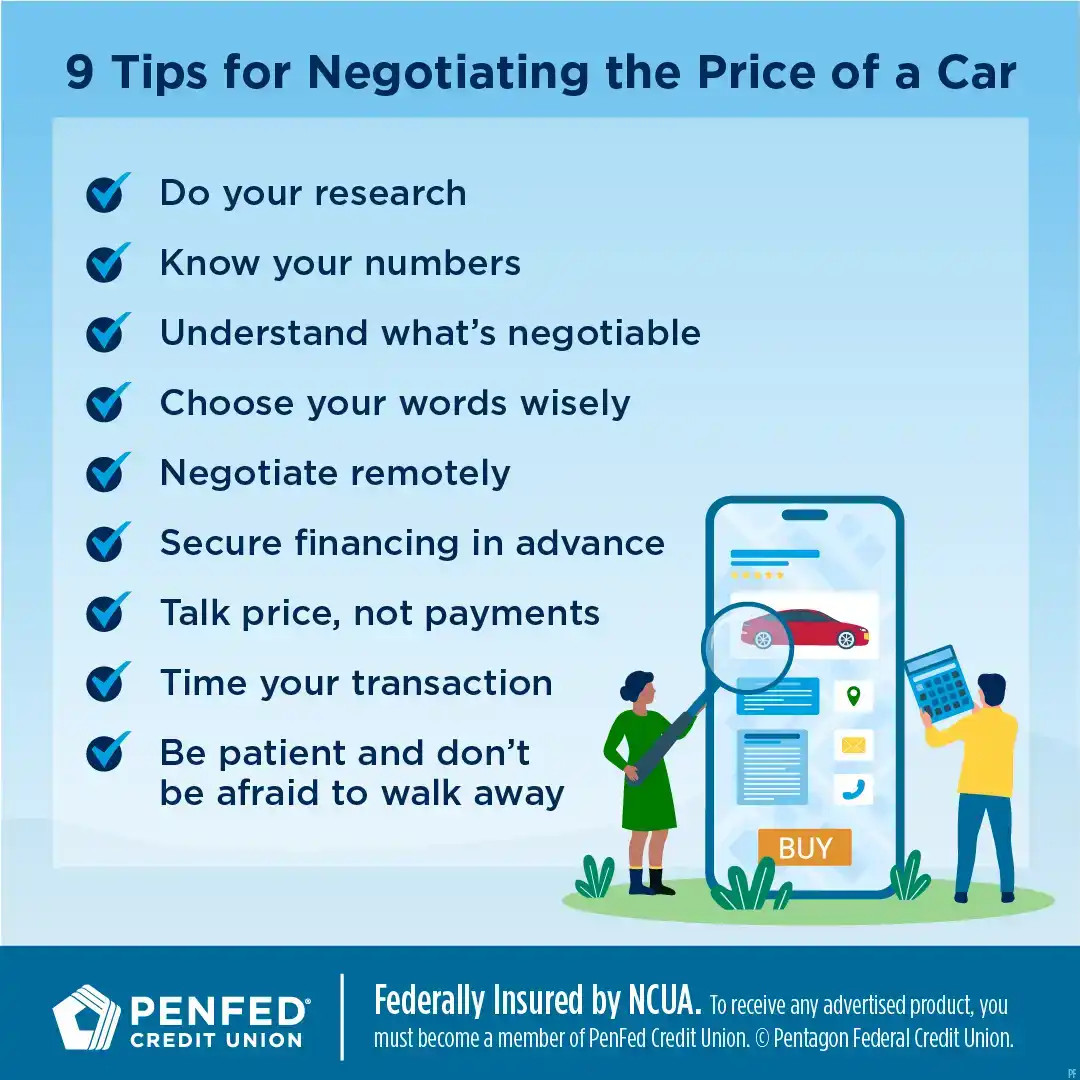AUTO
9 Tips for Negotiating the Price of a Car
EXPECTED READ TIME: 11 MINUTES
You may never come to enjoy haggling with a near stranger over the price of a vehicle, but there are ways to make negotiating more pleasant and productive for everyone involved.

1. Do Your Research
It's always better to negotiate from a position of power, and the best way to gain that advantage is with information. Start by referencing one or more trusted resources.
Kelley Blue Book
You've probably heard the term, "blue book value." Considered the gold standard in car buying research, Kelley Blue Book is a household name that has been around since 1926. It's a great resource for gathering pricing data and estimating the cost of new or used vehicles.
Edmunds
Much like KBB, Edmunds is an excellent source for pricing, ratings, and value information for new and used automobiles. Now owned by used-car retailer CarMax,Edmunds also features convenient links to an extensive inventory of preowned vehicles so you can move seamlessly from researching to browsing.
TrueCar
TrueCar, an automotive pricing and information website for new and used car buyers, allows you to research what others paid for vehicles in your local area and receive upfront prices from a network of more than 15,000 certified dealers.
TrueCar's "Market Average" feature is based on real local transaction data so you can prepare for your showroom showdown without being a mind reader.
Be sure to visit the websites of manufacturers and actual dealers in your area to familiarize yourself with features and options, see vehicle photos, and view estimated prices.
You can often find rebates and incentives on manufacturer websites and sites like Kelley Blue Book and Edmunds.
And don't forget to look for deals. You can often find rebates, discounts, monthly specials, and incentives for certain makes and models on manufacturer websites and sites like Kelley Blue Book and Edmunds.
2. Know Your Numbers
know-your-numbers
There are three crucial car buying numbers to keep in mind as you research. Knowing the difference will help you negotiate the best price for your car with confidence.
Manufacturer's Suggested Retail Price (MSRP)
Also known as the sticker price, MSRP is what the automaker recommends the dealer ask for the vehicle. It's also exactly what its name implies: a suggestion. Each dealer has the freedom to stick as close to — or veer as far away from — this price as they want to make a sale.
Fair Market Value
Fair market value (or range), however, is the actual "going rate" for a particular make and model configured with a specific set of features, accessories, and add-ons. Using fair market value, you can make an apples-to-apples price comparison to make sure the car you're looking at is really worth the price you see painted in the window.
Using fair market value, you can make an apples-to-apples price comparison to make sure the car you're looking at is really worth the price you see painted in the window.
Invoice Price
The invoice price is what the dealer claims the automaker charged them for the vehicle you're buying. It's sort of like a wholesale price, but the catch is that dealers frequently receive rebates, allowances, discounts, or incentives in order to turn a profit, so the price they ultimately pay — the dealer cost — is often lower than the invoice price you see.
In a perfect world, you could whittle the price of your dream car to below the invoice or dealer price. Chances are slim a dealer is going to take that loss, but if you aim for it, you'll probably still come out with a better deal.
3. Understand What’s Negotiable
Price is a given, but there are other things you can — in fact, should — negotiate when buying a new car or truck.
Interest Rate
Negotiating loan rates could save you hundreds or thousands of dollars over the life of the loan. Since dealers and lenders aren't required to offer you the best rates available, speak up and ask for the lowest interest rate and APR if you plan to finance your car through the dealership.
Speak up and ask for the lowest interest rate and APR if you plan to finance your car through the dealership.
Extended Warranty
Shopping around for an extended warranty can provide some negotiation leverage. Here are a few ways you can go about it:
- Call a few finance and insurance managers at other dealerships. Find out what they charge for extended warranties and bring that information to the negotiating table.
- Consider options from an outside company.You might be able to find an attractive, reasonably priced alternative to compare with your dealership's offering.
- Ask the dealer what their cost is for the warranty. If you can get an idea what they pay, you can then offer $100 to $200 above that number for the extra coverage package.
Upgrades and Add-ons
Profit margins are high on upgrades and add-ons, which means there's also room to negotiate. If there are certain vehicle options you want or need, ask the dealer to throw in (or at least discount) a few to help sweeten your deal. Common negotiable extras include:
- Service and maintenance plans
- Upholstery, paint, and lens protection
- Undercoating and rustproofing
- Window tinting
- Alarm system
- VIN etching
- Car mats
- Roof racks
- Rear entertainment system
- Key protection for lost fobs
4. Choose Your Words Wisely
When negotiating, show the dealer you've done your homework by basing your offer on research. For example, instead of saying, "I want to pay $20,100," try framing it this way: "I've compared five similar vehicles in the market, and the price range is between $20,500 and $21,700. I'm willing to offer you $20,100."
When negotiating, show the dealer you've done your homework by basing your offer on research.
The dealer may not accept your offer, but he or she will realize you're an informed buyer. This, in turn, will set the stage for a counteroffer that (hopefully) meets your budget.
5. Negotiate Remotely
If you have a busy family or work schedule — or both — and you don't have time to stand around the car lot negotiating, you can research pretty much everything you need to know about a vehicle online and you can even do most of your haggling through emails and texts.
In fact, negotiating remotely might be a better idea no matter what. For one, the anonymity helps to reduce much of the intimidation and emotion that can seep into the car-buying process. As a bonus, and it's a big bonus, negotiating the price of your car remotely also ensures you have everything in writing.
Negotiating the price of your car remotely ensures you have everything in writing.
If you choose this route, here's a good plan of action:
- Email the internet sales managers at several local dealerships through each one's company website.
- Tell them exactly what you're looking for and ask for their best out-the-door price.
- Let them know you have quotes from several other dealers in the area.
- Compare the prices and a breakdown of all the fees outlined in the quotes.
- Choose the best deal and go with it or use it as leverage to get a better price from another dealer.
Keep in mind that internet sales departments frequently strive for volume sales, so they'll often get to the best price more quickly than in-person sales agents. This can further decrease the pressure of the negotiating experience.
And remember you can still test drive your preferred make and model at the nearest dealership at any point before buying your car online.
You can still test drive your preferred make and model at the nearest dealership at any point before buying your car online.
6. Secure Financing in Advance
In many cases, you can save some time and money by lining up your car loan before stepping foot on a car lot. Start by getting preapproved for an auto loan through a credit union, bank, or online lender. A preapproval will provide you with an estimated loan amount, term, and interest rate.
Once you've negotiated a final price for the vehicle, compare the financing offered at the dealership to what you found on your own. Then, choose the option with the best rates and terms.
Once you've negotiated a final price for the vehicle, compare the financing offered at the dealership to what you found on your own.
Trading In Your Current Vehicle
If you want to offset the amount you'll need to finance, you might want to trade in your current vehicle to help pay for your new one. But first you'll need to know what it's worth. Sites like KBB and Edmunds can help you determine the trade-in based on a number of factors.
And here's a tip: don't tell the dealer you have a trade-in until you've settled on a price for the vehicle you're buying and negotiated any upgrades or add-ons that you want.
If you mention a trade-in early in the process, the dealer will try to bundle it into the purchase price. Keeping your trade-in separate will reduce confusion and ensure it isn't devalued in the transaction process.
If the dealer won't give you the amount you want for your trade-in, consider selling it privately or to a used-car retailer like CarMax.
Keeping your trade-in separate will reduce confusion and ensure it isn't devalued in the transaction process.
7. Talk Price, Not Payments
As you negotiate, concentrate on getting the best price overall before discussing monthly payment scenarios. Once you settle on a final price, then you can begin exploring ways to get your monthly rates where you need them to be.
Car salespeople often start negotiations at the monthly payment because their finance department can stretch out payments for years to arrive at a number that looks attractive.
Finance departments can stretch out payments for years to arrive at a number that looks attractive, but it’s probably not the lowest price overall.
But is it the lowest price? Probably not.
Extending an auto loan beyond five years may lower your monthly payments, but you'll pay more interest in the long run. It's easy to overlook this detail (which is what the dealership wants you to do) if your negotiations revolve around the monthly payment rather than the final purchase price.
8. Time Your Transaction
Ever wondered if you really get a better deal by waiting until the end of year to buy a new car or truck? Wonder no more — you do. Turns out when you purchase has a direct impact on the price you pay for a vehicle. Here are some of the best times to buy.
When you purchase has a direct impact on the price you pay for a vehicle.
Mondays
A study from TrueCar found that car shoppers who buy on Monday save around 8% more than those who purchase any other day. This makes sense when you consider that Mondays are typically slower on car lots, so salespeople have more time — and might be more inclined — to negotiate.
Second Half of Each Month
Manufacturers release their monthly incentive numbers in the first week of each month, so you're better off waiting until the latter part of any given month to negotiate. That's because sales managers are more likely to come down in price when all they need is to move just a few more cars to hit their sales targets.
Model Changeover Period
Automakers usually begin introducing the next year's models in August and September, which means October is a good month for incentives and discounts as dealers make room for new inventory. The price cuts may be even deeper if the new models feature extensive restyling or design overhauls.
End of the Calendar Year
Vehicle manufacturers typically offer substantial dealer incentives around the winter holidays to move cars and trucks when people are in the spending spirit. Plus, automakers and dealers alike prefer to have as little inventory as possible heading into a new year, making late December an ideal time for wheeling and dealing.
Vehicle manufacturers typically offer substantial dealer incentives around the winter holidays.
9. Be Patient and Don’t Be Afraid to Walk Away
Before you even begin your research, know this: one of the worst things you can do is appear desperate. As hard as it may be, try to show restraint during the negotiation process.
When it's time to talk price, let the salesperson go first. The opening number dictates where the rest of the conversation will go. If you name your price too soon and it's higher than what the salesperson was planning to quote, you can't go lower — even if the dealership was prepared to.
Once you counter the salesperson's number, be quiet. Chances are they'll fill the awkward silence that follows with a lower price or other concessions.
Counter with your lowest number, and don't forget tip #4 to communicate your reasoning with confidence. Once you counter the salesperson's number, be quiet. Chances are they'll fill the awkward silence that follows with a lower price or other concessions.
Finally, whether you're dealing with the salesperson face-to-face, by text, or via email, walk away or cut off communications if you aren't making progress. Remember, your time is money. If they truly want to make a deal, they know where to find you.
The Takeaway
In many respects, big-box and online auto retailers have transformed the buying experience for used vehicles with no-haggle pricing and other convenience-driven approaches. Elements of these tactics are (slowly) being incorporated by some traditional dealers, yet it's uncertain when — or even if — they'll gain widespread acceptance at car lots nationwide.
Until then, the most effective way to get the best deal possible on a car is to do your research, plan your strategy, and negotiate with confidence.
Find Out More About Car Loan Options Through PenFed
Discover the diverse offerings of products, services, and support available to our members.




